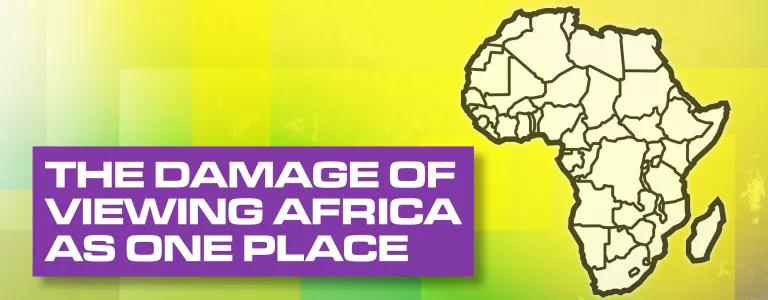
The Damage Of Viewing Africa As One Place
Africa is a continent with 54 countries, but how many times have you heard someone say they are “Going to Africa”? Or that they are “Watching a film set in Africa” or “Eating African food”. Imagine speaking about Europe the same way. Going on a trip to Europe could mean going to Barcelona, Venice or Milton Keynes. The food could be fish and chips, paella or pickled herrings. This is clearly a huge generalisation, similar to how some people see the continent of Africa, which in reality contains much more variety and distinct cultures than is often thought.
In fact, Africa is the most genetically diverse continent and is thought by many scientists to be the place where humans originated. Continents like Europe are significantly less diverse, for example, it is estimated that 2,000 languages are spoken in the whole of Africa, compared to only about 200 languages spoken throughout Europe. So why is Africa seen as only one place more often than Europe or North America are?
One of the main reasons for this is its representation in film and the media. A disproportionate amount of representation portrays Africa solely as desert with a few huts and lions roaming through villages. Despite the fact that this may be true for a few places, there are many other features, people, and societies which are underrepresented. Although the amount of accurate representation is increasing, there is still a lack of it, and it is fairly rare to see the wealthy people, cities, rainforests, lakes and mountains of Africa on screen.

In her Ted Talk, ‘The danger of a single story’, author Chimamanda Ngozi Adichie says, “If I had not grown up in Nigeria, and if all I knew about Africa were from popular images, I too would think that Africa was a place of beautiful landscapes, beautiful animals, and incomprehensible people, fighting senseless wars, dying of poverty and AIDS, unable to speak for themselves and waiting to be saved by a kind, white foreigner.”
An alternate explanation for how it isn’t just white people who are often uneducated grouping all countries in Africa together is given by artist and film director Gabrielle Tesfaye. She says "For the black diaspora, Africa becomes just one word for an entire continent. It's important to understand that people who are a part of the history of the transatlantic slave trade don't know where in Africa they are from. And that's why the word Africa is a vague thing for them, because they don't know."
The impact this incorrect view of Africa has on society today is huge. Seeing Africa as a monolith of poverty, corruption and hunger perpetuates stereotypes that lead to racism and prejudice. These stereotypes and lack of positive representation can result in inequality, and are one of many causes of statistics like black employees only occupying 1.5% of leadership positions in the UK, despite being double that, 3%, of the population.
Furthermore, the constant association of Africa with hunger leads to the view that it is inevitable and part of life for the people there. This stops us from examining the causes of the problems in some African countries, and insulates us from the knowledge that this is a real human problem, not just the permanent state of a place.
Africa is a beautiful and diverse continent with many different cultures, languages and traditions. Therefore, when something specific to one country is referred to as only being “African”, it not only is incorrect, it also diminishes the identities of each individual country. So, next time you see someone reference “Africa” generally when they are talking about something which is related to only one country, ask them which one they are talking about. This way we will all start to learn about and appreciate the differences between places in one of the most diverse continents.





